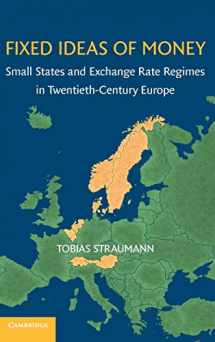
Fixed Ideas of Money: Small States and Exchange Rate Regimes in Twentieth-Century Europe (Studies in Macroeconomic History)
ISBN-13:
9780521112710
ISBN-10:
0521112710
Edition:
1
Author:
Tobias Straumann
Publication date:
2010
Publisher:
Cambridge University Press
Format:
Hardcover
414 pages
Category:
Economic History
,
Economics
,
Money & Monetary Policy
,
Foreign Exchange
,
International Business
FREE US shipping
Book details
ISBN-13:
9780521112710
ISBN-10:
0521112710
Edition:
1
Author:
Tobias Straumann
Publication date:
2010
Publisher:
Cambridge University Press
Format:
Hardcover
414 pages
Category:
Economic History
,
Economics
,
Money & Monetary Policy
,
Foreign Exchange
,
International Business
Summary
Fixed Ideas of Money: Small States and Exchange Rate Regimes in Twentieth-Century Europe (Studies in Macroeconomic History) (ISBN-13: 9780521112710 and ISBN-10: 0521112710), written by authors
Tobias Straumann, was published by Cambridge University Press in 2010.
With an overall rating of 4.5 stars, it's a notable title among other
Economic History
(Economics, Money & Monetary Policy, Foreign Exchange, International Business) books. You can easily purchase or rent Fixed Ideas of Money: Small States and Exchange Rate Regimes in Twentieth-Century Europe (Studies in Macroeconomic History) (Hardcover) from BooksRun,
along with many other new and used
Economic History
books
and textbooks.
And, if you're looking to sell your copy, our current buyback offer is $0.3.
Description
Most European countries are rather small, yet we know little about their monetary history. This book analyses for the first time the experience of seven small states (Austria, Belgium, Denmark, the Netherlands, Norway, Sweden, and Switzerland) during the last hundred years, starting with the restoration of the gold standard after World War I and ending with Sweden's rejection of the Euro in 2003. The comparative analysis shows that for the most part of the twentieth century the options of policy makers were seriously constrained by a distinct fear of floating exchange rates. Only with the crisis of the European Monetary System (EMS) in 1992-93 did the idea that a flexible exchange rate regime was suited for a small open economy gain currency. The book also analyses the differences among small states and concludes that economic structures or foreign policy orientations were far more important for the timing of regime changes than domestic institutions and policies.


We would LOVE it if you could help us and other readers by reviewing the book
Book review

Congratulations! We have received your book review.
{user}
{createdAt}
by {truncated_author}


